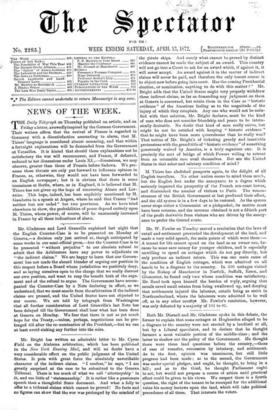Mr. Gladstone and Lord Granville explained last night that the
English Counter-Case is to be presented on Monday at .0eneva,—a decision only just arrived at, though anticipated by some weeks in our semi-official press,—but the Counter-Case is to be presented "without prejudice" to our absolute refusal to admit that the Arbitrators have any power to adjudicate on "the indirect claims." We are happy to learn that our Govern- ment has not made the absurd blunder of arguing our position in this respect before a Board whose jurisdiction we positiVely deny, and so laying ourselves open to the charge that we really distrust -our own position, and want to reap the benefit both of the argu- ment and of the refusal to argue. The Government have accom- panied the Counter-Case by a Note declaring in effect, as we understand, that we must secede from the arbitration if the indirect claims are pressed, and the United States have not objected to -our course. We are told by telegraph from Washington that all further consideration of Lord Granville's last Note has been delayed till the Government shall hear what has been done at Geneva on Monday. We fear that there is not as yet much hope for the Treaty,—unless, perhipe, negotiations can be pro- longed till after the re-nomination of the President,—but we can at least avoid sinking any further into the mire.


































